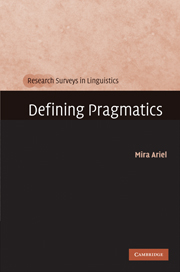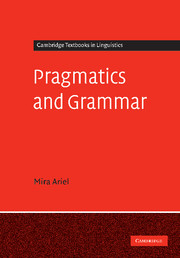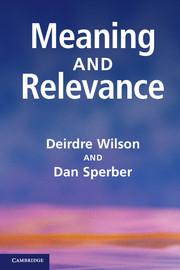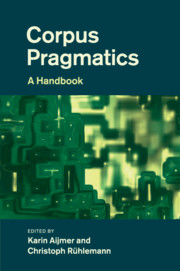Defining Pragmatics
Although there is no shortage of definitions for pragmatics the received wisdom is that 'pragmatics' simply cannot be coherently defined. In this groundbreaking book Mira Ariel challenges the prominent definitions of pragmatics, as well as the widely-held assumption that specific topics – implicatures, deixis, speech acts, politeness – naturally and uniformly belong on the pragmatics turf. She reconstitutes the field, defining grammar as a set of conventional codes, and pragmatics as a set of inferences, rationally derived. The book applies this division of labor between codes and inferences to many classical pragmatic phenomena, and even to phenomena considered 'beyond pragmatics'. Surprisingly, although some of these turn out pragmatic, others actually turn out grammatical. Additional intriguing questions addressed in the book include: why is it sometimes difficult to distinguish grammar from pragmatics? Why is there no grand design behind grammar nor behind pragmatics? Are all extragrammatical phenomena pragmatic?
- Includes a basic introduction to the main topics in pragmatics
- Shows how different approaches to pragmatics can be integrated with each other
- Based on natural, attested examples, from many languages
Reviews & endorsements
'In a masterful confrontation with decades of received wisdom, Mira Ariel redefines the proper task of pragmatics in a simple, crystal clear way. An essential read.' Arie Verhagen, Leiden University Centre for Linguistics
'… a new way to unify the field of linguistic pragmatics. Ariel critically surveys ten criteria for defining pragmatics, and argues for equating it with inferential as opposed to encoded meaning. She then shows how to apply the definition to the complete range of topics taken to constitute pragmatics in a broad sense.' Nancy Hedberg, Simon Fraser University
'Defining Pragmatics is an authoritative pragmatics text which has properly seated pragmatics in linguistic studies. It presents an unprecedented coherent pragmatic programme, which can be conveniently fleshed out from existing pragmatics texts, and which needs full development for further systematicity. Professional pragmatists and other linguists should therefore find the text an invaluable working tool.' Akin Odebunmi, Discourse Studies
'In this groundbreaking book, Ariel deconstructs the field of pragmatics and demonstrates how it can be reconstituted on a code versus inference distinction as a basis for a grammar/pragmatics divide … an excellent and exciting book.' Qingli Zhao, Journal of Pragmatics
Product details
June 2010Hardback
9780521517836
348 pages
235 × 158 × 23 mm
0.68kg
4 tables
Available
Table of Contents
- 1. What's under the big-tent pragmatics?
- Part I. Deconstructing Pragmatics:
- 2. Surveying multiple-criterion definitions for pragmatics
- 3. Problematizing the criteria
- Part II. Reconstituting Pragmatics:
- 4. Grammar as code, pragmatics as inference
- 5. Inferential pragmatic theories
- Part III. Mapping the Big Tent:
- 6. The canon
- 7. Functional syntax
- 8. Beyond pragmatics
- 9. Many questions, some resolutions.





